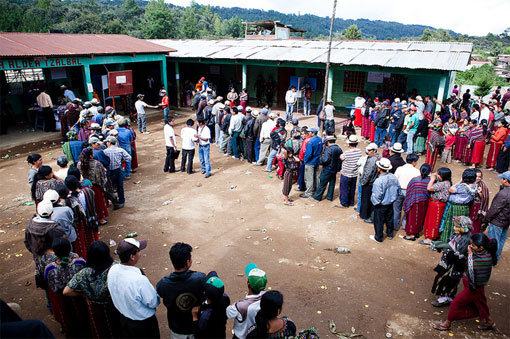With all votes counted within a couple of hours of polls closing on Sunday, November 6, retired general Otto Pérez Molina was confirmed the new president of Guatemala, beating rival Manuel Baldizón by 53.74 percent to 46.26 percent.
This year’s election was the second-largest presidential runoff turnout in Guatemala’s history. By the end of the night, Pérez Molina and his Patriot Party secured 2,300,874 votes to Baldizón and his LIDER party, with 1,998,819.
The largest turnout for a second-round election was in 1985, at 65.3 percent, when democratic elections returned to the country for the first time since the coup against President Jacobo Árbenz in 1954. But last weekend was not far behind, with a turnout of 60.8 percent. For much of the day the turnout was projected to be around 50 percent, with some departments such as Escuintla reporting it to be 40 percent in mid-afternoon.
Pleas from the media, the Tribunal Supremo Electoral (TSE) and the candidates themselves saw a late flood of voters, many of whom were motivated by the polarized options for president, as well as fear, civic responsibility and individual gain. Both parties were accused of offering coupons to exchange for building materials or fertilizer and money for votes.
Pérez Molina will be the first former general to be democratically elected as president when he assumes office in January 2012 and his vice-president, Roxana Baldetti, will be Guatemala’s first ever woman to hold that role.
Baldetti described herself as “a woman committed to the women of Guatemala. Starting today it’s a new life for Guatemalan women.” A former journalist for Univision’s Primer Impacto crime program, she also worked with the United Nations at a national level promoting women’s rights. In the 1990s she was appointed by then-President Jorge Antonio Serrano Elías to the foreign ministry. At the turn of the century she helped Pérez Molina to form Partido Patriota (PP) before being elected to Congress in 2004. Since 2009 she has been the general secretary of the party as well as their leader in Congress.
“Baldetti has that authoritarian characteristic that identifies strong leaders in this country,” said Álvaro Velasquez, political professor and researcher at Facultad Latinoamericana de Ciencias Sociales (FLACSO). “It shouldn’t be a novelty that she will be vice-president but in a traditional country like ours it is.”
The front-runner since the beginning of the election campaign, Pérez Molina has followed the historical path to the Guatemalan presidency. In 2007, he lost the second-round vote to incumbent President Álvaro Colom.
In a country with a population of more than 14 million, winning Guatemala City—with over 2 million inhabitants—was critical for Pérez Molina’s success. Had he failed to win the capital and lost Quetzaltenango, the country’s third biggest city, the election result could have been far different.
“The alliances Otto Pérez Molina made in the capital were to his benefit,” said Velasquez. “Baldizón’s alliances were weaker because they only had two months to organize.”
Baldizón enjoyed a rapid rise in his profile since this past May, when he was polling just 4 percent of the vote. However, his decision to make the outer regions of the country his power base may have backfired.
Reports suggest that had Baldizón won both cities he would have become the next president with a vote breakdown of 1.9 million to 1.7 million.
“Most of [Baldizón’s] votes came from rural areas so maybe this was a mistake,” said Velasquez. “Where he campaigned, he won. He might not have won the presidency but he won a lot of supporters.”
Hailing from Pétén in the far north of the country, Baldizón’s policies such as Bono 15, an extra monthly salary and promises to improve social programs initiated by Sandra Torres, the ex-wife of President Colom, resonated with the poor that mainly live in Guatemala’s outlying departments. The parties that he allied with also had their power bases mainly in rural areas; the downside of this strategy was ceding urban regions to his opponent.
Pérez Molina’s power base was in the country’s major cities, where people are more inclined to be interested in the presidential race.
“I voted for Otto. The other candidate does not know Antigua at all. He spent all his time in the countryside,” said shop assistant Fidelia Tecún de Acajabón.
For international observers, the relative peaceful nature of the second round was cause for celebration. The TSE identified areas that had the potential for conflict after analyzing first-round incidents and deployed a heavy police and army presence.
The main incidents involved journalists. The first saw a Salvadorian photographer get too close to President Colom, which resulted in his security detail stepping in. The photographer ended up in hospital with rib injuries. In the second, a journalist for national TV channel Guatevision was roughed up by the bodyguards of Unidad Nacional de la Esperanza Congressman Mario Rivera in El Quiché. Two civil national police agents have been arrested under suspicion of failing to intervene in the alleged assault.
“In the first round it was a matter of one or two reports per minute, problems here, problems there, violence in some of the centers,” said Carlos Ponce, coordinator general of Red Latinoamericana y del Caribe international election observers.
Following recommendations made by various groups, the TSE made efforts to improve the organization, training and quality of electoral materials.
“We never expected that they would be ready to change the whole system,” added Ponce.
Despite reports of “cash-for-votes” schemes, there was no repeat of the spontaneous riots and deaths from the first round. These improvements, coupled with enhanced quality of ballot papers saw election observers in Guatemala City turn their attention to events in Nicaragua, whose citizens also went to the polls on Sunday.
The main issue that dominated this election was security, even among many Baldizón supporters for whom his promises of improved social programs and economic incentives were enticing. As a former military intelligence officer, Pérez Molina had promised to use this experience to disrupt the organized crime groups in Guatemala.
“The government staff will work 60 to 70 percent of the time on safety,” said Pérez Molina during his victory speech. “I can promise that you will see a difference.”
This will come as welcome news to Guatemalans still coming to grips with the aftereffects of the 36-year civil war and the increasing control of the country by narcotrafficking cartels.
“I know he’s not going to do miracles but if he reduces the violence and the criminality, he will at least have made a little difference,” said psychologist Maria Eugenia Mejia Antigua Guatemala.
Baldetti will be a central figure to PP’s plans as the party plans to face the problem of the lack of an overall majority in Congress.
Baldizón will have many opportunities to influence the next four years with a congressional alliance and having seemingly come from nowhere to 2 million votes in five months.
“From today I will be the leader of the opposition,” said Baldizón in his concession speech. “We will be the guardians of Pérez Molina’s promises.”
With key alliances, support in the city, the promise of an iron fist against crime and impunity and the weight of tradition, Pérez Molina also had one major advantage.
“Pérez Molina won in a country swept by violence and where he had the support of the financial conservative powers. For them he was the only option,” Velasquez said.







